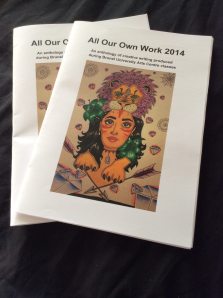A post by Tala Birch, Library Assistant.
The Burnett archive of working class autobiographies is home to over 230 items. These range broadly in format, content and timespan. The archive documents the lives of working class people in England, Wales and Scotland between 1790 -1945. The autobiographies vary from verse like Kathleen Hilton-Foord’s thirty-six page Grannie’s Girl to extensive prose like James H. Mackenzie’s Strange Truth: the autobiography of a circus, showman, stage & exhibition Man. McKenzie’s 50,000 handwritten words include a contents page so you can flick easily to one of the many “weird, pathetic, amusing, tragic and informative incidents” in his life.
But just as interesting as Mckenzie’s promise of outlandish stories are the accounts of people with less exotic occupations such as Charles Lewis Hansford’s Diary of a Bricklayer, 52,000 words on the construction industry, life in different towns, pubs, trade unionism, the London lockout of 1914 and unemployment. Dig a little deeper in the collection and you find much more fragmentary and brief, but still fascinating, accounts.
One such account is that of Alice M. Collis, written in retrospect about a strike at a printing firm in 1911. Collis writes “I’ve often wondered if I was the youngest trade union representative ever”. At 15, she began working on envelope machines for low pay. Two years into working at the unnamed firm, Collis along with “other girls” who worked on the machines decided to go on strike “although [they] had no idea what this would mean”.
The girls did not belong to any trade union but soon received support from the compositor’s union once word had gotten around the firm about the strike, and then from Mary MacArthur, an important figure in the labour movement. The direct action resulted in a 50% pay rise for the girls. Following their success, they formed a branch of the National Federation of Women Workers (the general women’s union founded by MacArthur 3 years earlier), with a 17 year old Collis being elected as their representative.
The Burnett archive contains many first-hand accounts of the development of the labour movement in England, told by workers, people who, like Collis, are often left out of mainstream historical narratives. The archive is a valuable resource where you will also find details of people’s domestic lives, insights into the popular culture of the time, descriptions of factory and farm work as well as people’s experiences of unemployment and poverty, stories that might otherwise go untold.
References:
- Brunel University London library homepage (accessed 16/3/2016) http://brunel.ac.uk/library
- Collis, Alice M. My First Strike. 1909. (1972) http://bura.brunel.ac.uk/handle/2438/9481
- Everyday lives in war website (accessed 16/3/2016) https://everydaylivesinwar.herts.ac.uk/
- Mackenzie, James H. (b.1862) Strange Truth. The Autobiography of a Circus, Showman, Stage & Exhibition Man
- Perera, Kathryn Mary MacArthur: the unstoppable power of organization (2010) http://labourlist.org/2010/12/mary-macarthur-the-unstoppable-power-of-organisation/
- Writing Lives: collaborative research project on working-class autobiography (accessed 16/3/2016) http://www.writinglives.org/


